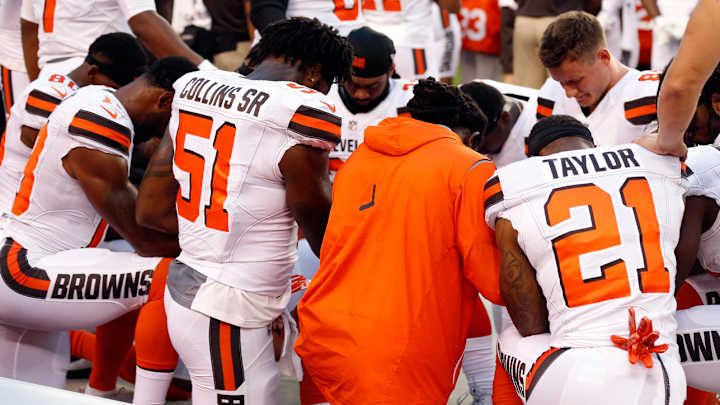What the Expanding Anthem Protests Mean

Colin Kaepernick may no longer be in the NFL, but the movement he started one year ago is stronger than ever.
Last night in Cleveland, before the nationally broadcast preseason game between the Giants and Browns on “Monday Night Football,” a group of close to a dozen Browns players chose to take a knee during the national anthem. Among the group was Seth DeValve, a second-year tight end from Princeton, the first white player who has knelt for the anthem to show solidarity against racial injustices and discrimination in the United States.
When Kaepernick was first noticed kneeling for the anthem during a preseason game last summer, his gesture turned from a curiosity into a national dialogue. Even as the former 49ers quarterback explained the reasons behind his actions, it was the way he protested that became a hot-button issue, far more than the meaning behind it. Kaepernick has remained unsigned in the NFL since he and the 49ers parted ways, which makes the fact that the movement he started is gaining steam, not losing it, all the more remarkable.
One major reason why: The white supremacist rally that took place in Charlottesville, Va., last weekend, an ugly reminder to Americans of all races and colors that the very things Kaepernick was standing up against are more present in our country than many of us would like to believe. The rally, which resulted in the death of one counter-protester and violence against others, took place during the first week of preseason games. In the days that followed, more NFL players than ever have taken part in, or supported, quiet demonstrations during the national anthem.
Seattle’s Michael Bennett called for support from white players to help advance the movement, and before DeValve kneeled, Philadelphia’s Chris Long stood with his arm around teammate Malcolm Jenkins, Oakland’s Derek Carr did the same with Khalil Mack, and Seattle’s Justin Britt put his hand on the shoulder of a kneeling Bennett—all images, for a national audience, of support and inclusion.
Law Enforcement Officers Hold Rally For Colin Kaepernick in Brooklyn
It’s significant that an increasing number of players are becoming involved with demonstrations during the national anthem because, back in March before the start of free agency, ESPN reported that Kaepernick himself said he would stand for the anthem in 2017. Even with that assurance to teams, he still finds himself unemployed for reasons that without doubt go beyond what he has to offer on the football field.
The issue of demonstrating during the national anthem has proved to be one of the most divisive we’ve seen in the NFL in years. In considering Kaepernick, teams have weighed fan backlash and the impact it might have on business, something Ravens owner Steve Bisciotti openly admitted after his team had discussions with Kaepernick earlier in training camp. When there’s that kind of response to an act that’s entirely lawful and peaceful, it’s notable that more players would willingly join the movement.
NYC Protest: Standing Up for Colin Kaepernick
Last week, Browns coach Hue Jackson showed up at his press conference with a prepared statement to clarify his views on players kneeling for the anthem, after his earlier words had been construed as him not supporting such a demonstration. The point he’d been trying to make was that he wanted his players to be respectful and thoughtful in any display they considered.
Monday night, they were exactly that. A national audience saw the biggest group yet of both kneelers and supporters, players who were both black and white, joining in a quiet show of solidarity on a national platform. Kaepernick doesn’t have a place on an NFL sideline anymore, but his message has a bigger place than ever.
Question or comment? Email us at talkback@themmqb.com.
